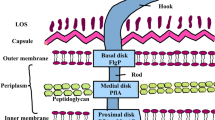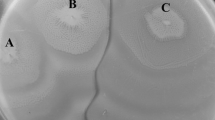Abstract
Rhizopus species are opportunistic pathogens and cause infections which lead to deaths in individuals with the weakened immune system. Some strains of Rhizopus species have been detected to have a symbiotic relationship with bacteria. The toxicity of the Rhizopus species is important. Because strains harbouring endofungal bacteria are able to produce secondary metabolites and if endofungal bacteria are released from mycelium, serious problems can occur. We aimed to investigate the presence of endofungal bacteria in Rhizopus species isolated from food samples. Rhizopus species were isolated from different food samples. The presence of endofungal bacteria in the Rhizopus isolates was investigated. Rhizopus strains containing the endofungal bacteria were identified through phenotypic and genotypic methods. Universal primers amplifying bacterial 16S rRNA region were used to amplify 1.2–1.5-kb fragment from fungal metagenomic DNA. Sequence analysis of PCR products amplified from fungal metagenomic DNA was made. Fluorescence microscopy and scanning electron microscopy were used to visualize the presence of endofungal bacteria in fungal hyphae. According to our results, the Rhizopus strains is associated with Serratia marcescens, Pseudomonas fluorescens and Klebsiella pneumoniae. Until now there is no evidence that Pseudomonas fluorescens and Klebsiella pneumoniae were identified as endofungal. These species are opportunistic pathogen dangerous for humans. It is important for humans not only the presence of the fungi but also the presence of the endofungal bacteria in foods. Our work is important because it draws attention to the presence of endofungal bacteria in foods. Because there is danger releasing of a bacterium from the mycelium, it is likely to face sepsis or serious problems.





Similar content being viewed by others
References
Brendel N, Partida-Martinez LP, Scherlach K, Hertweck C (2007) A cryptic PKS-NRPS gene locus in the plant commensal Pseudomonas fluorescens Pf-5 codes for the biosynthesis of an antimitotic rhizoxin complex. Org Biomol Chem 5:2211–2213. https://doi.org/10.1039/b707762a
Dolatabadi S, Scherlach K, Figge M, Hertweck C, Dijksterhuis J, Menken SB, de Hoog GS (2016) Food preparation with mucoralean fungi: a potential biosafety issue? Fungal Bio 120(3):393–401. https://doi.org/10.1016/j.funbio.2015.12.001
Domsch KH, Gams W, Anderson TH (1980) Compendium of soil fungi. Academic Press, London, pp 136–140
Estrada-de los Santos P, Vinuesa P, Martínez-Aguilar L, Hirsch AM, Caballero-Mellado J (2013) Phylogenetic analysis of Burkholderia species by multilocus sequence analysis. Curr Microbiol 67:51–60. https://doi.org/10.1007/s00284-013-0330-9
Hoffmann K, Sabrina D, Voigt K (2007) Revision of the genus Absidia (Mucorales, Zygomycetes) based on physiological, phylogenetic, and morphological characters; thermotolerant Absidia spp. form a coherent group, Mycocladiaceae fam nov. Mycol Res 111(Pt 10):1169–1183. https://doi.org/10.1016/j.mycres.2007.07.002
Hover T, Maya T, Ron S, Sandovsky H, Shadkchan Y, Kijner N, Mitiagin Y, Fichtman B, Harel A, Shanks RM, Bruna RE, García-Véscovi E, Osherov N (2016) Mechanisms of bacterial (Serratia marcescens) attachment to, migration along, and killing of fungal hyphae. Appl Environ Microbiol 18(9):2585–2594. https://doi.org/10.1128/AEM.04070-15
Ibrahim AS, Gebremariam T, Liu M, Chamilos G, Kontoyiannis D, Mink R, Kwon-Chung KJ, Fu Y, Skory CD, Edwards JE Jr, Spellberg B (2008) Bacterial endosymbiosis is widely present among Zygomycetes but does not contribute to the pathogenesis of Mucormycosis. J Infect Dis 7:1083–1090. https://doi.org/10.1086/591461
Jennessen J, Nielsen KF, Houbraken J, Lyhne EK, Schnürer J, Frisvad JC, Samson RA (2005) Secondary metabolite and mycotoxin production by the Rhizopus microsporus group. J Agric Food Chem 53:1833–1840. https://doi.org/10.1021/jf048147n
Khan HA, Baig FK, Mehboob R (2017) Nosocomial infections: epidemiology, prevention, control and surveillance. Asian Pac J Trop Biomed 7(5):478–482. https://doi.org/10.1016/j.apjtb.2017.01.019
Lackner G, Partida-Martinez LP, Hertweck C (2009a) Endofungal bacteria as producers of mycotoxins. Trends Microbiol 17(12):570–576. https://doi.org/10.1016/j.tim.2009.09.003
Lackner G, Möbius N, Scherlach K, Partida-Martinez LP, Winkler R, Schmitt I, Hertweck C (2009b) Global distribution and evolution of a toxigenic Burkholderia-Rhizopus symbiosis. Appl Environ Microbiol. https://doi.org/10.1128/AEM.01765-08
Lackner G, Hertweck C (2011) Impact of endofungal bacteria on infection biology, food safety, and drug development. PloS Pathog 7(6):1–4. https://doi.org/10.1371/journal.ppat.1002096
Lackner G, Moebius N, Partida-Martinez LP, Boland S, Hertweck C (2011) Evolution of an endofungal lifestyle: deductions from the Burkholderia rhizoxinicagenome. BMC Genomics 12:1–13. https://doi.org/10.1186/1471-2164-12-210
Liu D, Coloe S, Baird R, Pedersen J (2000) Rapid mini-preparation of fungal DNA for PCR. J Clin Microbiol 38(1):471
Moebius N, Üzüm Z, Dijksterhuis J, Lackner G, Hertweck C (2014) Active invasion of bacteria into living fungal cells. Elife. https://doi.org/10.7554/eLife.03007
Möbius N, Hertweck C (2009) Fungal phytotoxins as mediators of virulence. Curr Opin Plant Biol 12(4):390–398. https://doi.org/10.1016/j.pbi.2009.06.004
Ohshima S, Sato Y, Fujimura R, Takashima Y, Hamada M, Nishizawa T, Narisawa K, Ohta H (2016) Mycoavidus cysteinexigens gen. nov., sp. nov., an endohyphal bacterium isolated from a soil isolate of the fungus Mortierella elongate. Int J Syst Evol Microbiol 66(5):2052–2057. https://doi.org/10.1099/ijsem.0.000990
Pakvaz S, Soltani J (2016) Endohyphal bacteria from fungal endophytes of the Mediterranean cypress (Cupressuss empervirens) exhibit in vitro bioactivity. For Path 46:569–581. https://doi.org/10.1111/efp.12274
Partida-Martinez LP, Hertweck C (2005) Pathogenic fungus harbours endosymbiotic bacteria for toxin production. Nature 437:884–887. https://doi.org/10.1038/nature03997
Partida-Martinez LP, Groth I, Schmitt I, Richter W, Roth M, Hertweck C (2007a) Burkholderia rhizoxinica sp. nov. and Burkholderia endofungorum sp. nov., bacterial endosymbionts of the plant-pathogenic fungus Rhizopus microsporus. Int J Syst Evol Microbiol 57:2583–2590. https://doi.org/10.1099/ijs.0.64660-0
Partida-Martinez LP, de Looss CF, Ishida K, Ishida M, Roth M, Buder K, Hertweck C (2007b) Rhizonin, the first mycotoxin ısolated from the Zygomycota, is not a fungal metabolite but ıs produced by bacterial endosymbionts. Appl Environ Microbiol. https://doi.org/10.1128/AEM.01784-06
Partida-Martinez LP, Hertweck C (2007) A gene cluster encoding rhizoxin biosynthesis in “Burkholderia rhizoxinica”, the bacterial endosymbiont of the fungus “Rhizopus microsporus”. ChemBioChem 8:41–45. https://doi.org/10.1002/cbic.200600393
Partida-Martinez LP, Monajembashi S, Greulich KO, Hertweck C (2007c) Endosymbiont-dependent host reproduction maintains bacterial-fungal mutualism. Curr Biol 17:773–777. https://doi.org/10.1016/j.cub.2007.03.039
Partida-Martinez LP, Bandemer S, Rüchel R, Dannaoui E, Hertweck C (2008) Lack of evidence of endosymbiotic toxin-producing bacteria in clinical Rhizopusisolates. Mycoses 51:266–269. https://doi.org/10.1111/j.1439-0507.2007.01477.x
Robertson J, Mc Goverin C, Vanholsbeeck F, Swift S (2019) Optimisation of the protocol for the LIVE/DEAD® BacLightTM bacterial viability kit for rapid determination of bacterial load. Front Microbiol V. https://doi.org/10.3389/fmicb.2019.00801
Rohm B, Scherlach K, Möbius N, Partida-Martinez LP, Hertweck C (2010) Toxin production by bacterial endosymbionts of a Rhizopus microsporus strain used for tempe/sufu processing. Int J Food Microbiol 136:368–371. https://doi.org/10.1016/j.ijfoodmicro.2009.10.010
Samson RA, Houbraken J, Thrane U (2010) Food and ındoor fungi. CBS KNAW Biodiversity center, Utrecht
Samson RA, Visagie CM, Houbraken J, Hong SB, Hubka V, Klaassen CH, Perrone G, Seifert KA, Susca A, Tanney JB, Varga J, Kocsubé S, Szigeti G, Yaguchi T, Frisvad JC (2014) Phylogeny, identification and nomenclature of the genus Aspergillus. Stud Mycol 78:141–173. https://doi.org/10.1016/j.simyco.2014.07.004
Schmitt I, Partida-Martinez LP, Winkler R, Voigt K, Einax E, Dölz F, Telle S, Wöstemeyer J, Hertweck C (2008) Evolution of host resistance in a toxin producing bacterial-fungal alliance. ISME J 2:632–641. https://doi.org/10.1038/ismej.2008.19
Schulz-Bohm K, Tyc O, de Boer W, Peereboom N, Debets F, Zaagman N, Janssens TKS, Garbeva P (2017) Fungus-associated bacteriome in charge of their host behavior. Fungal Genet Biol 102:38–48. https://doi.org/10.1016/j.fgb.2016.07.011
Shao B, Wu J, Tian B, Ouyang Q (2015) Minimum network constraint on reverse engineering to develop biological regulatory Networks. J Theor Biol 380:9–15. https://doi.org/10.1016/j.jtbi.2015.05.005
Sivakami R, Mahalakshmi M, Premkishore G (2015) A comparison of chitinolytic bacteria and their enzymatic activity in two freshwater systems. Int J Curr Microbiol App 4(5):454–458
Zhang Y, Hong PY, LeChevallier MW, Liu WT (2015) Phenotypic and phylogenetic identification of coliform bacteria obtained using 12 coliform methods approved by the US environmental protection Agency. Appl Environ Microbiol 81(17):6012–6023. https://doi.org/10.1128/AEM.01510-15
Acknowledgements
The authors are thankful to Izmir Institute of Technology, Biotechnology and Bioengineering Central Research Laboratories, Ege University, Science Faculty and Ege University Central Research Testing and Analysis Laboratory Research and Application Center (EGE-MATAL). This work was supported by BAP Project (17- FEN-044), Ege University.
Author information
Authors and Affiliations
Corresponding author
Ethics declarations
Conflict of interest
No conflict of interest declared.
Additional information
Communicated by Erko Stackebrandt.
Publisher's Note
Springer Nature remains neutral with regard to jurisdictional claims in published maps and institutional affiliations.
Rights and permissions
About this article
Cite this article
Birol, D., Gunyar, O.A. Investigation of presence of endofungal bacteria in Rhizopus spp. ısolated from the different food samples. Arch Microbiol 203, 2269–2277 (2021). https://doi.org/10.1007/s00203-021-02251-4
Received:
Revised:
Accepted:
Published:
Issue Date:
DOI: https://doi.org/10.1007/s00203-021-02251-4




